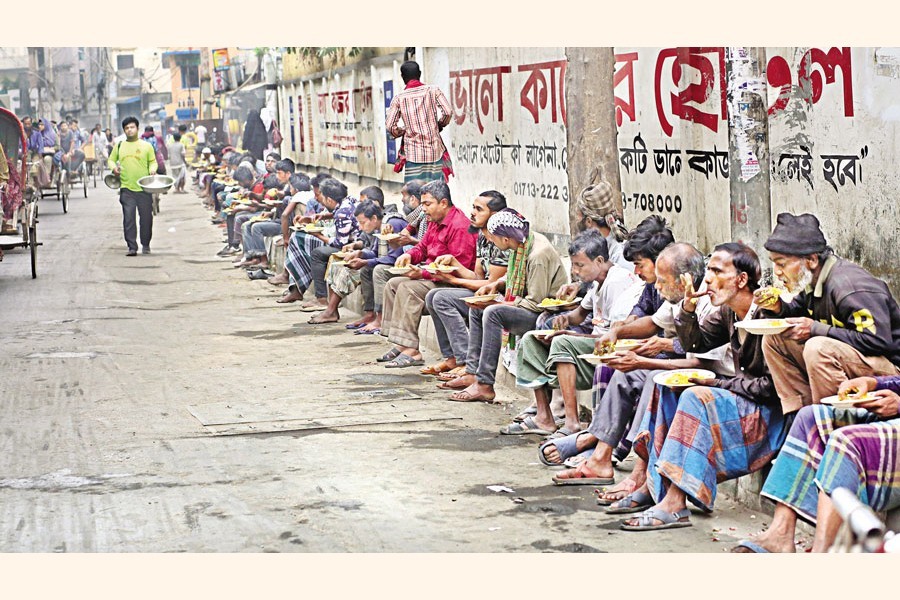The feeding of a large number of hungry people at a street corner last week as shown in a FE photograph was filled with the features of lofty benevolence and humanity. The young volunteers feeding assorted people belonged to an organisation called 'Bhalo Kajer Hotel' (Hotel dedicated to good deed). The view of feeding a large group of poverty-stricken people was touchy, eye-moistening and not encountered too often in the capital. It was because the persons were visibly hungry, and too poor to arrange their lunch. Perhaps this was the dominant reason the youth charity group provided the meal for free. Only two years back, during the corona pandemic, several such feedings of the pandemic struck people would be arranged for people without food.
Normally, during the post-natural calamity times free meals are supplied by the government organisations and many private entities. Such scenes are rare during normal times. At this point many might want to know what is really meant by 'normal times'. The answers might vary. Now that the intensity of Covid-19 has dropped to a great extent, hungry people moving in the city streets point to a hidden malaise. It can be interpreted in a way which says the corona fallout has yet to leave the country for good. And the people eating on a Dhaka footpath edge are still economically hard pressed like those in the other Bangladesh cities. If it's not the case, the all-male crowd could be termed unemployed and are long habituated to such charity feeding programmes. A few in the group are well dressed and do not appear to be destitute, who also dominate the people eating their mid-day meal at the venue. Majority of the latter are said to be underprivileged. Every day, the charity organisation arranges the feeding programme for over 1,000 people. It has been said the organisation's aim is to inspire people to do at least one good job every day. It sounds good and really inspiring.
But beneath the surface an unpalatable truth remains active. It comes in the form of the presumed pockets of poverty and hunger in the post-corona society. If there are such unidentifiable segments in the broader social structure, it portends a greater malady. Hidden poverty corrodes a society from within. The traditional poor can be recognised; they are identifiable. The problem lies with the unemployed and poverty-stricken gentlemen, who are apparently well-dressed. Finding these people among the recognisable hungry gives rise to many a distressing question. In Bangladesh, data of the real hungry is difficult to obtain. Many hide the fact that they are starving. They view it as a shame. This picture is available in the cities' low-income areas. Many unemployed people and social drifters also go without food on days and nights. It's out of a sense of duty and empathy that the social organisations come up and stand by these hapless people.
Thanks to the sense of prestige of the people belonging to the urban lower and lower middle classes, the poverty situation of these people does not often come clear. On the other hand, joining a charity footpath meal once or twice doesn't make them part of the poverty-stricken classes. But in public perception they are. Bangladesh couldn't remain free of the impacts of the Ukraine stalemate which lately emerged in the form of a global economic crisis. The country's urban lower-middle and lower classes were not spared these blows. As a consequence, the domino impact to be precise, the presence of lower-middle class free-meal seekers among the underprivileged is nothing unique. The fallout of the Ukraine conflict began being felt in Bangladesh in a short time. By that time, the runaway price hike of every necessity of life had brought untold sufferings to the average people. Lately, the menace of price hike has returned with a vengeance.
Providing meals for free among the underprivileged may appear a small issue. Many would like to compare it with Iftar sessions. There is a big difference. Institutions and organisations arrange Iftar sessions on being driven by a religious impulse. It's implied that they would be served for free. In the case of free- meals there are scopes for 'ifs'. In a situation like this, it is the dedicated Good Samaritans who finally emerge as the friends of the underprivileged. It's the ultra-poor for whom the social organisations arrange food for free. The fulcrum of the topic being feeding the poor, there are scopes for bringing into focus the similar feeding programmes in the country's urban points. A few organisations have earned a lot of kudos in the recent times by feeding the poor and the low-income people for free. Those are, in essence, philanthropic organisations --- their main activities inclusive of sectors like food and child education and hygiene. The NGOs are not normally seen engaging themselves in feeding the poor.
It is the area-based social organisations who normally come forward to carry out these tasks. In the past, state-backed entities used to organise these feeding programmes meant for the poor. The administration is apparently busy bringing discipline to the uncontrollable and the chaotic market. Despite the measures of market control not going with the free economy, its absence is acutely felt in times of emergencies. When it comes to the price hike of all essential commodities including rice, flour and vegetables, the desperate urban poor go out searching for free-meal outlets. Amid the starving crowd a few well-dressed people stand out. They are also urban poor. Outward apparel doesn't speak all about a human being.


